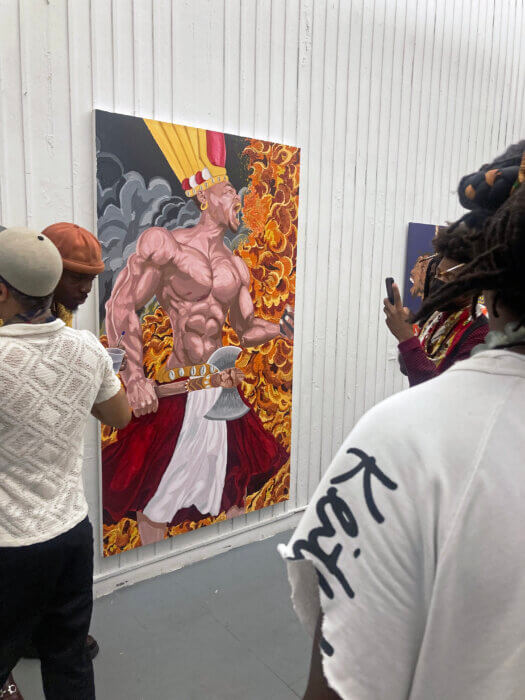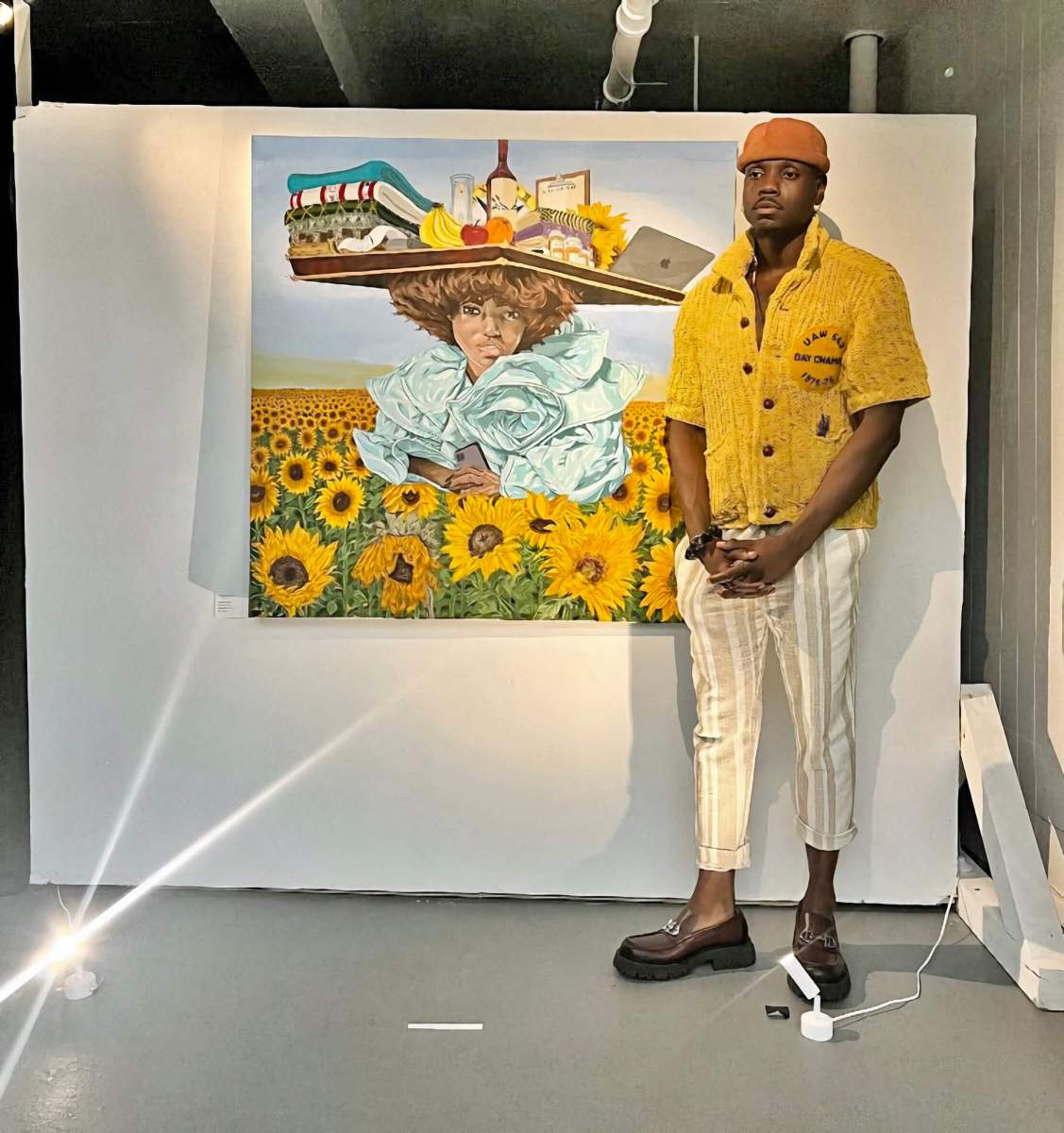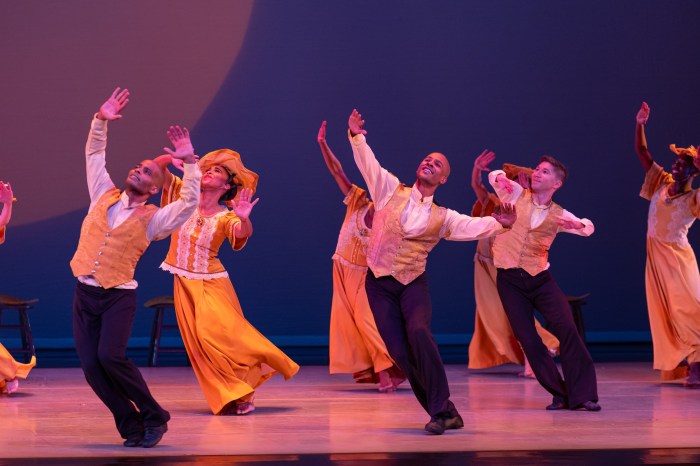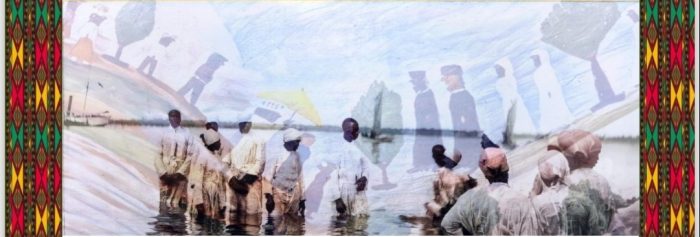Watson Mere, the Haitian American artist who is currently in the same ranks as Jean Michel Basquiat, Pablo Picasso, Henri Matisse, and Vincent Van Gogh exhibited several of his latest pieces during his first solo exhibition at Chashama, an art gallery located at 227 West 29th St. on Saturday, July 1.
Previously, Mere had showcased his artwork at bars with other artists. But this was his first solo exhibition at an art gallery in Manhattan, NY. This is significant to him because his artwork continuously getting the recognition it deserves. The self-taught artist was born and raised in Belle Glade, South Florida. His parents moved to the United States from Haiti in the early 1980s.
Mere, who holds a Bachelor’s Degree in Business Administration and a Master’s Degree in Business Administration from Florida A&M University, has been drawing since he was two years old. He started creating art since middle school at age 13. As a child, Picasso, Basquiat, and Hector Hyppolite inspired him. During the past seven years, he exhibited his work in various locations including New York City, Venice, Italy; the United Kingdom and Philadelphia. His paintings have received several awards and recognition over the years, including the Jean-Michel Basquiat Award from Creole Image Honors in 2018, the New Futures Award from The Other Art Fair in 2021, and the NextGen 10 from C-Suite Quarterly in 2018.
“My goal in each piece is to create an image that the observer can’t passively view but is drawn to engage with,” stated Mere in an interview with Caribbean Life Newspaper.
Two of my favorite pieces from this exhibition were the painting of his aunt and the piece entitled“Sango Baba Wa.”
What is the story behind this piece? Or what do you intend to convey here?
Answer: The piece has several avenues of meaning. The piece is somewhat of an ode to my great aunt who was the first person in my family to move to the United States from Haiti. She was an entrepreneur in the neighborhood and through her business she was able to get some of her nieces to the United States from Haiti in which one of these nieces was my mother. The piece is also inspired by the motif of the African women carrying baskets of their livelihoods on their heads. I wanted to make a modern black woman living in America version of this motif where the black woman was carrying everything that she was dealing with within her life on her head. The piece also deals with the human psychological tendency to focus on the negative aspects of our lives despite how many positives we have going on. In the piece, the figure is focused on a single withering sunflower even though she is walking within a field full of an abundance of blossoming.
What was the process like when creating this piece? (In terms of specific date, or time you started to paint this piece), and how many days did it take for you to complete it?
Answer: I started working on this piece in September 2022, so it took roughly nine months to complete. I wanted to take my time with this piece since I was using techniques never seen in my prior work.
Second Art Piece:

What is the story behind this piece entitled “Sango Baba Wa”? Or what do you intend to convey here?
Answer: During May and June of 2022, I was offered the opportunity to play SANGO in the leading role of a play entitled “The Fourth Alaafin of Oyo” by Taiwo Aloba during the 2022 New York Theatre Festival. The play won the Most Creative Play that year. The experience of playing the mighty Orisha was so powerful and intense that I felt the need to express the deity through my primary creative outlet.
What was the process like when creating this piece? (In terms of specific date, or time you start to paint this piece), and how many days did it take for you to complete it?
Answer: I have been working on this piece for about six months. I started in January 2023 and completed the piece in July 2023. The fire in the piece took several hours as I was utilizing a technique that I am still developing.
This is your first solo exhibition in a Manhattan art gallery. What do you think about that? Do you feel that your work is receiving the recognition it deserves?
Answer: I am tremendously excited about the solo exhibition. It’s really something I’ve been gearing up for the past few years, and to have it in an art gallery in Manhattan does make me feel like the work is being recognized in a way that is in alignment with the hard work and dedication that I put inside of each work of art.
Your followers and supporters have placed your artwork in the same hierarchy as Jean Michel Basquiat, Pablo Picasso, Henri Matisse and Vincent Van Gogh. If those legends were still alive today what do you think their perspective would be about your work?
Answer: I’m not sure since all these legends were so different both within their artistic and lifestyle. I think Basquait would’ve liked the black subject matter and concepts of my work. Picasso and Matisse would’ve been interested in the bodies I paint often in my work. And Van Gogh may have probably appreciated the sunflowers in my work since the image of sunflowers was a constant motif in his pieces as well.
Haiti’s political climate is brutal at the moment. There has been a constant problem of kidnappings, massacres, and destruction since Haiti gained independence in 1804. What do you think is the solution, and how can the Haitian diaspora evoke change? If so, what role would you play in this revolutionary change?
Answer: The turmoil that has been rocking Haiti recently has left all Haitians both on the island and abroad in a deep state of distress. There are many possible solutions, but I do believe that Haitians on the continent along with Haitians throughout the diaspora need to work together to formulate a plan rather than relying on outside entities since we as a community have the best interest of the nation in mind. One of my biggest dreams and visions as to how I could play a role in reshaping the current crisis in our beloved nation is to create an art institution in Haiti that will hone and sharpen the abundance of creative talent within the youth of Haiti. The institution would offer art opportunities both in the nation and abroad to these gifted youths while also allowing them to focus on productive and creative tasks.
Anything else you would like to say about your work, yourself or the direction you plan on taking with your art work?
Answer: I think of my work as a window. For some, the window reflects the viewer’s own experiences or ideologies, for others, it presents a view into a world they may have never noticed or understood, allowing them to analyze and consider new ideas and perspectives. My goal in each piece is to create an image that the observer can’t passively view but is drawn to engage with. The inspiration for my work is derived from the cultural complexities of those who identify with the African diaspora.
Watson Mere’s work can be found at https://linktr.ee/artofmere; https://www.instagram.com/artofmere_/



























